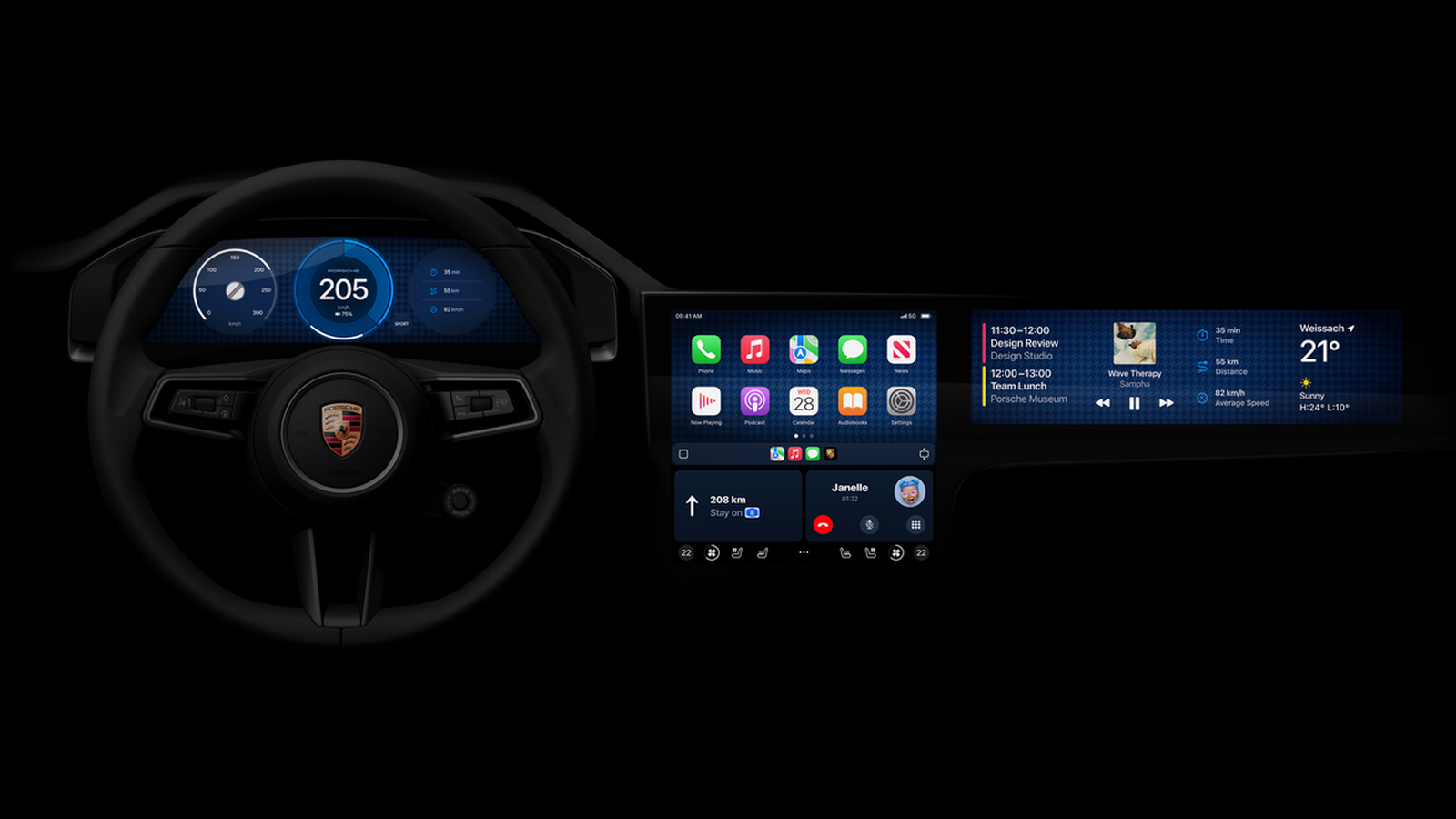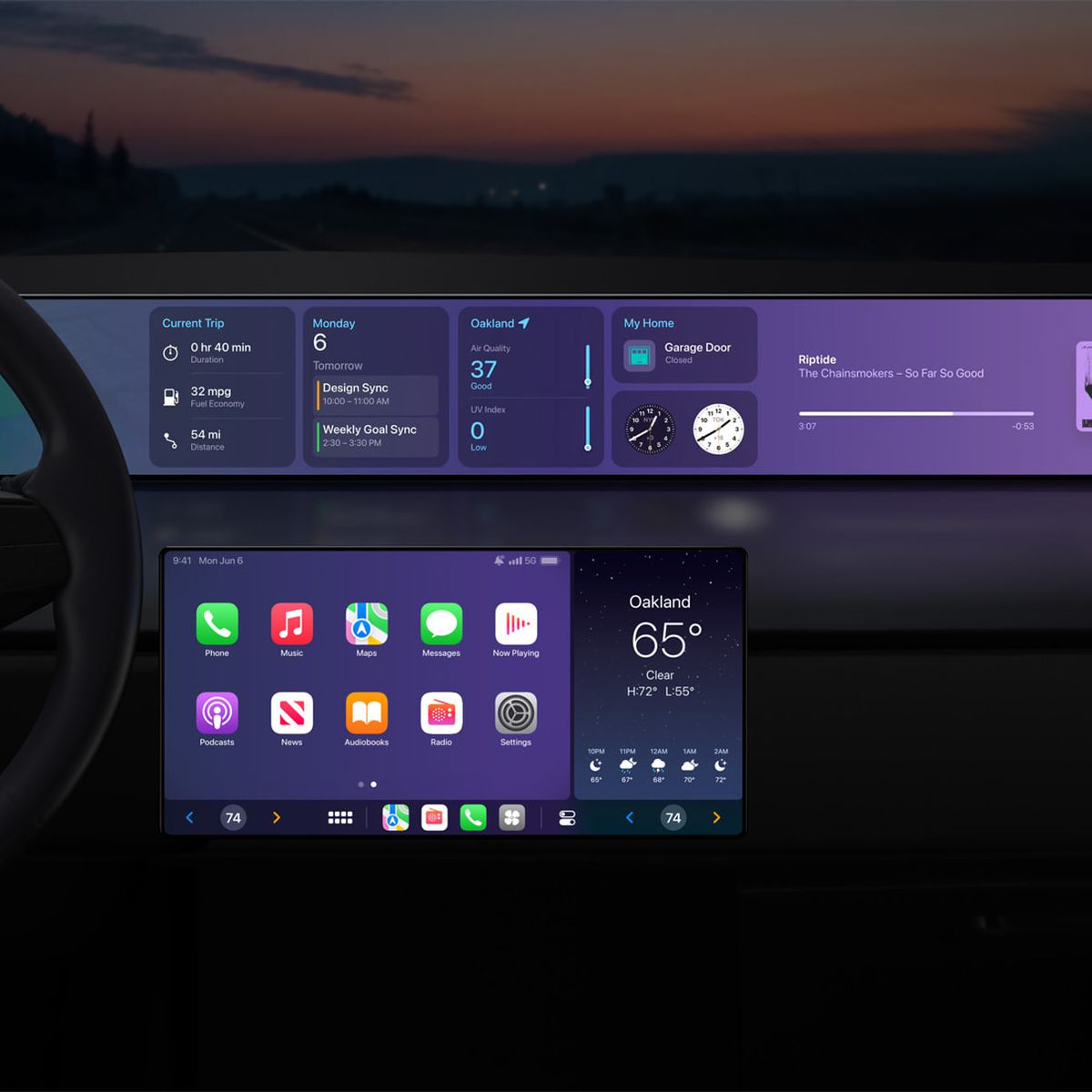Apple’s CarPlay 2 Will Change How You Drive — Here’s Why It’s Worth the Wait
- CarPlay 2 is about to control more than just your tunes—think speedometer and fuel gauges, too.
- Full wireless integration is coming in 2024, but will CarPlay 2’s connection hold up?
- Spatial Audio on the road? CarPlay 2 promises next-level sound... if you can wait for it.
Apple first previewed its next-generation CarPlay system at WWDC 2022, alongside iOS 16. Fast forward two years, and CarPlay 2 is yet to hit the market. While much remains speculative, leaks and rumors give us a glimpse into what Apple might have in store for the future of in-car software. Apple’s goal is clear: they want to extend CarPlay’s capabilities beyond infotainment and into full vehicle control. Photo via Apple Inc. // The CarPlay 2 dashboard, featuring customizable layouts that reflect each car brand's unique design.
Photo via Apple Inc. // The CarPlay 2 dashboard, featuring customizable layouts that reflect each car brand's unique design.
The Future of CarPlay: A Seamless Vehicle Interface
One of the most anticipated features of the upcoming Apple CarPlay is its ability to integrate with a vehicle’s entire dashboard, controlling every aspect from the speedometer to the fuel gauge. This would allow drivers to see key information like fuel levels, tachometer readings, and temperature indicators on a unified screen. This deep integration also means car manufacturers can retain their brand identity by customizing the interface’s design.
The goal? A bespoke experience that caters to each brand’s aesthetic while maintaining Apple’s clean and user-friendly interface. Expect to see an assortment of gauge cluster designs, making it possible to select what best suits your driving style.
Expanding the Dashboard
In a significant upgrade, the new CarPlay will expand beyond just the infotainment screen, allowing seamless integration across multiple displays inside the car. Your dashboard will no longer be segmented; instead, gauges and controls will appear unified on one continuous screen. This customizability will let manufacturers adjust CarPlay to their own design preferences while delivering a cohesive look.
“CarPlay in the Driver’s Seat”
CarPlay is expanding its footprint in your car, aiming to take over control of not just entertainment but essential vehicle functions, too.Insider sources spoken to by Apple Scoop reveal.
In addition to vehicle displays, Apple CarPlay 2024 will reportedly allow users to control climate settings directly from the main screen. Adjustments like fan speed and temperature could soon be just a tap away. There will also be better integration with rear parking cameras and electric vehicle monitoring, including charge levels.
Widgets, another CarPlay staple, will be front and center in the new design. These provide at-a-glance details such as weather, trip info, and fuel economy.
A New Standard for Vehicle Control
CarPlay’s new generation will include features such as controlling HomeKit-compatible devices from the car, which means being able to adjust your home’s lights or thermostat from the driver’s seat. More significantly, CarPlay will go fully wireless, eliminating the need for an iPhone cable. However, while wireless integration is promising, it does raise questions about connection stability.
New Apps for a Connected Experience
The 2024 version of CarPlay isn’t just about redesign; it’s about enhanced functionality. Expect new apps specifically designed for vehicle control, including tools for managing paired iPhones, checking charging status, adjusting climate settings, and even monitoring tire pressure.
Apple’s latest CarPlay will primarily be offered in high-end vehicles, with early adopters likely to include Audi, Ford, and Mercedes-Benz. While the new system is expected to hit select models in 2024, no official launch date has been confirmed.
The Long-Awaited Spatial Audio Support
Apple CarPlay enthusiasts have long been waiting for Spatial Audio to make its debut in vehicles. This feature, promised during the release of iOS 18, would offer a superior listening experience for vehicles with multichannel audio capabilities.
Recent reports suggest that Spatial Audio could finally be on the horizon. According to user feedback, iOS 18.0.1 is beginning to show signs of the feature’s development. One Reddit user claimed they spotted the “Spatial Audio” flag while playing a song through CarPlay, but noted it could have been a bug since it didn’t reappear for other songs. This hints that Apple might be quietly testing the feature ahead of a broader release in iOS 18.1.
A Mixed Bag of Features
While Apple has been gradually improving CarPlay, many long-requested features are still missing. Spatial Audio is one feature Apple fans are desperate to see but has yet to officially roll out. Meanwhile, iOS 18 brought only minor updates to CarPlay, such as adding contact icons in Messages and notification banners for texts.
CarPlay’s evolution seems to have stalled for now, but all eyes are on the next-generation system that Apple teased in 2022. If this new version delivers on its promises, it could revolutionize how drivers interact with their vehicles. However, given the delay in its release, CarPlay 2 may not arrive until well into 2024, potentially with no meaningful impact before 2025. Photo via MacRumors // CarPlay 2 will offer wireless integration, removing the need for any physical connection to your iPhone.
Photo via MacRumors // CarPlay 2 will offer wireless integration, removing the need for any physical connection to your iPhone.
Key Takeaways:
- Expanded Dashboard Control: Next-gen CarPlay will integrate with vehicle gauges like the speedometer and odometer, offering a seamless, fully customizable interface.
- Wireless Connection: Apple is ditching cables for a fully wireless experience, though concerns about stability remain.
- Spatial Audio Coming Soon: iOS 18.1 could finally bring the highly anticipated Spatial Audio support to CarPlay.
- High-End Models First: Audi, Mercedes-Benz, and Ford are expected to be among the first to roll out vehicles with the new CarPlay system in 2024.
Recommended by the editors:
Thank you for visiting Apple Scoop! As a dedicated independent news organization, we strive to deliver the latest updates and in-depth journalism on everything Apple. Have insights or thoughts to share? Drop a comment below—our team actively engages with and responds to our community. Return to the home page.Published to Apple Scoop on 11th October, 2024.
No password required
A confirmation request will be delivered to the email address you provide. Once confirmed, your comment will be published. It's as simple as two clicks.
Your email address will not be published publicly. Additionally, we will not send you marketing emails unless you opt-in.